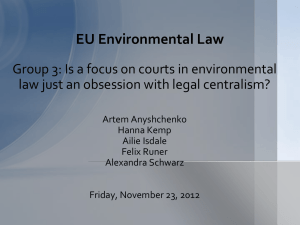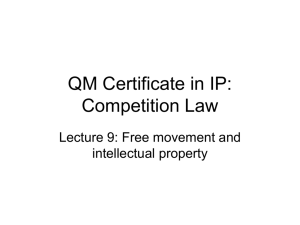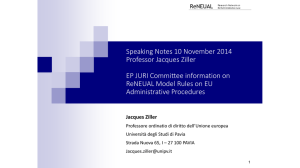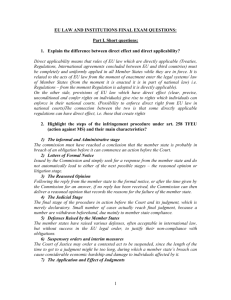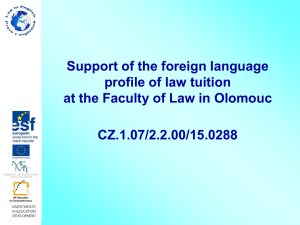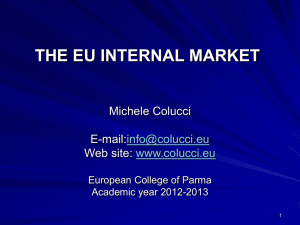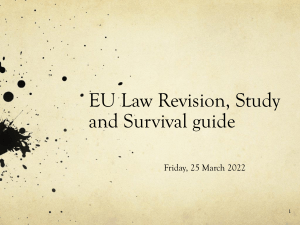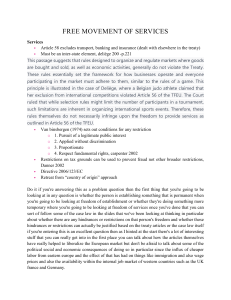1 PROOF OF LEGAL ACT Whereas: a) The objective behind the
advertisement
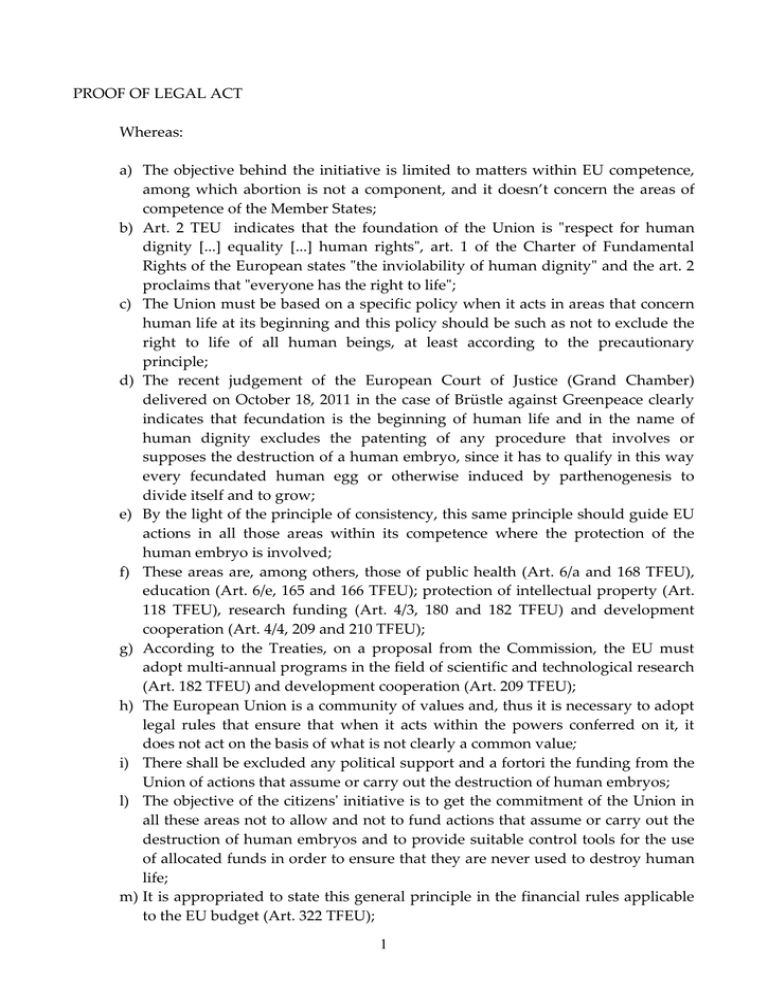
PROOF OF LEGAL ACT Whereas: a) The objective behind the initiative is limited to matters within EU competence, among which abortion is not a component, and it doesn’t concern the areas of competence of the Member States; b) Art. 2 TEU indicates that the foundation of the Union is "respect for human dignity [...] equality [...] human rights", art. 1 of the Charter of Fundamental Rights of the European states "the inviolability of human dignity" and the art. 2 proclaims that "everyone has the right to life"; c) The Union must be based on a specific policy when it acts in areas that concern human life at its beginning and this policy should be such as not to exclude the right to life of all human beings, at least according to the precautionary principle; d) The recent judgement of the European Court of Justice (Grand Chamber) delivered on October 18, 2011 in the case of Brüstle against Greenpeace clearly indicates that fecundation is the beginning of human life and in the name of human dignity excludes the patenting of any procedure that involves or supposes the destruction of a human embryo, since it has to qualify in this way every fecundated human egg or otherwise induced by parthenogenesis to divide itself and to grow; e) By the light of the principle of consistency, this same principle should guide EU actions in all those areas within its competence where the protection of the human embryo is involved; f) These areas are, among others, those of public health (Art. 6/a and 168 TFEU), education (Art. 6/e, 165 and 166 TFEU); protection of intellectual property (Art. 118 TFEU), research funding (Art. 4/3, 180 and 182 TFEU) and development cooperation (Art. 4/4, 209 and 210 TFEU); g) According to the Treaties, on a proposal from the Commission, the EU must adopt multi-annual programs in the field of scientific and technological research (Art. 182 TFEU) and development cooperation (Art. 209 TFEU); h) The European Union is a community of values and, thus it is necessary to adopt legal rules that ensure that when it acts within the powers conferred on it, it does not act on the basis of what is not clearly a common value; i) There shall be excluded any political support and a fortori the funding from the Union of actions that assume or carry out the destruction of human embryos; l) The objective of the citizens' initiative is to get the commitment of the Union in all these areas not to allow and not to fund actions that assume or carry out the destruction of human embryos and to provide suitable control tools for the use of allocated funds in order to ensure that they are never used to destroy human life; m) It is appropriated to state this general principle in the financial rules applicable to the EU budget (Art. 322 TFEU); 1 IT IS SUGGESTED THE RIDER OF THE FOLLOWINGS LEGISLATIVE ACTS 1: The Financial Regulation applicable to the general budget of the European Communities: amendment to the Regulation (EC, Euratom) N. 1605/2002 of the Council of 25 June 2002 that decides the Financial Regulation applicable to the general budget of the European Communities TITLE II BUDGETARY PRINCIPLES CHAPTER 9 (new) Principle of consistency Article 31 (new) No budget allocation will be made for the funding of activities that destroys human embryos, or that presumes their destruction 2: Research funding: Amendment to the Proposal of a Regulation of the European Parliament and Council that establishes a framework program for research and innovation (2014-2020) - Horizon 2020 - COM (2011) 809 final edition Artiche 16 (Ethical principles) 1. (...) 2. (…) 3. The following research areas are not funded: (a) research activities direct towards the human cloning; (b) research activities directed to modify the genetic inheritance of human beings that could make such changes heritable; (c) research activities intended to create human embryos only for research or for stem cell procurement, including by means of somatic cell nuclears. 2 (d) research activities that destroy human embryos, including those aimed at obtaining stem cells, and research involving the use of human embryonic stem cells in subsequent steps to obtain them. 4. (...) 5. (…) 3: Development cooperation: Amendment of Regulation (EC) N. 1905/2006 of the European Parliament and the Council of 18 December 2006 establishing a financing instrument for development cooperation Artiche 2 (scope) 1. (…) 2. (…) 3. (…) 4. (…) 5. The assistance of the Union, on the basis of this Regulation, shall not be used to fund abortion, directly or indirectly, through the funding of organizations that encourage or promote abortion. No reference is made in this Regulation to reproductive and sexual health, health care, rights, services, supplies, education and information at the International Conference on Population and on Development, its principles and Program of Action, the Cairo Agenda and the Millennium Development Goals, in particular MDG n. 5 about health and maternal mortality, can be interpreted as providing a legal basis for using EU funds to finance directly or indirectly abortion 6) (previous article 5) 7) (previous article 6) 3

